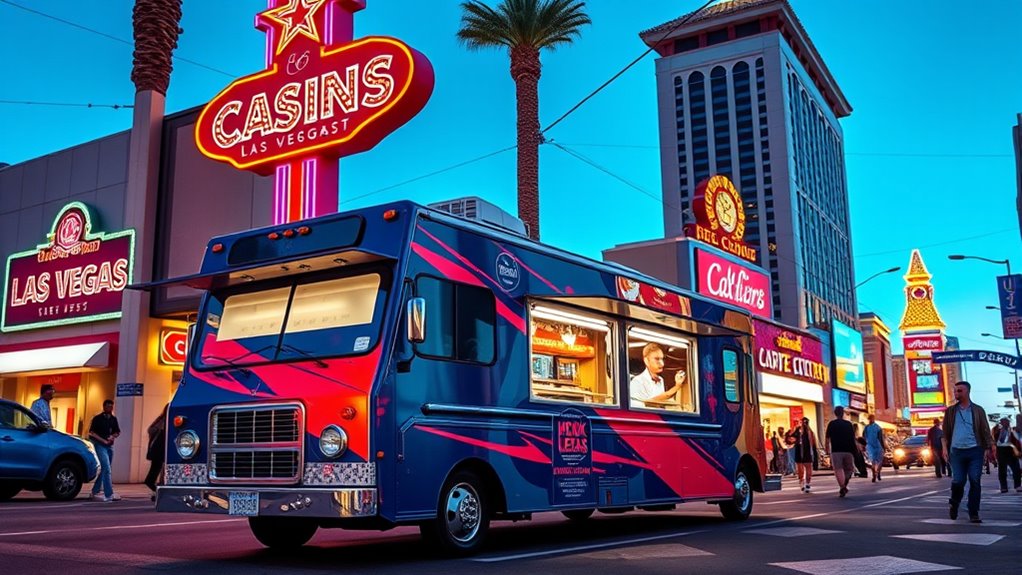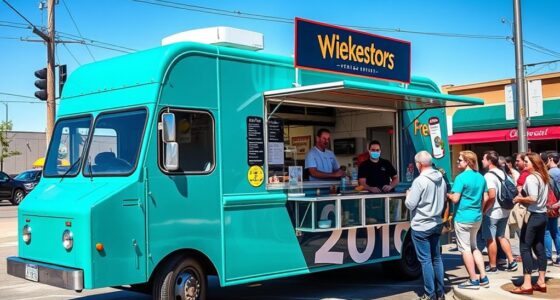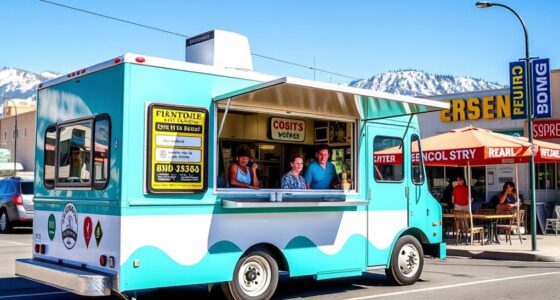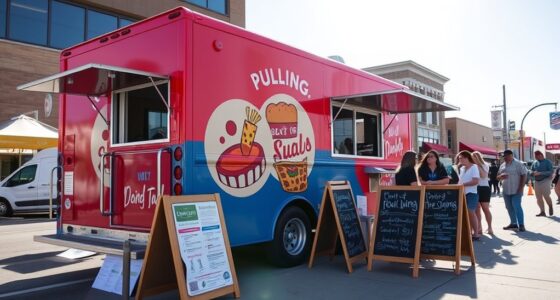To open a food truck in Las Vegas, you’ll need to secure multiple permits, including a business license, mobile vendor license, health permits, and vehicle registration, which can cost from around $150 to over $28,000 annually. Choose high-traffic locations and set your operating hours to attract steady crowds. Develop a compliant menu with local safety standards and implement marketing tactics like social media and event participation. Keep exploring for detailed steps to launch your food truck successfully.
Key Takeaways
- Obtain multi-jurisdictional business, health, and mobile vendor licenses, and pass required inspections to ensure compliance with Nevada regulations.
- Budget for permits, vehicle processing, health permits, insurance, and operational expenses like staffing and supplies.
- Choose high-traffic locations such as the Strip, Fremont, and event venues, and schedule hours based on customer demand.
- Develop a compliant menu featuring popular cuisines, allergen info, and equipment considerations to meet health standards.
- Promote your food truck via social media, participate in local events, and build customer loyalty through targeted marketing.
Navigating Permit and Licensing Procedures in Las Vegas

Navigating permit and licensing procedures in Las Vegas can seem complex, but understanding the process helps streamline your food truck operations. First, you’ll need a business license from your home jurisdiction—Las Vegas, North Las Vegas, Henderson, or Clark County. A multi-jurisdictional license simplifies this by allowing you to apply or renew one license, with optional add-ons for nearby areas, saving time. You’ll also submit an application, undergo criminal background checks, and prove financial suitability if you have a 10% or greater ownership stake. Each truck requires an individual mobile vendor license, displayed prominently, along with vehicle registration, insurance, and health permits. Coordination among fire departments and health agencies ensures inspections are efficient, especially for trucks operating across multiple jurisdictions. Incorporating proper regulatory compliance measures is essential to avoid delays or fines.
Ensuring Health and Safety Compliance for Your Food Truck
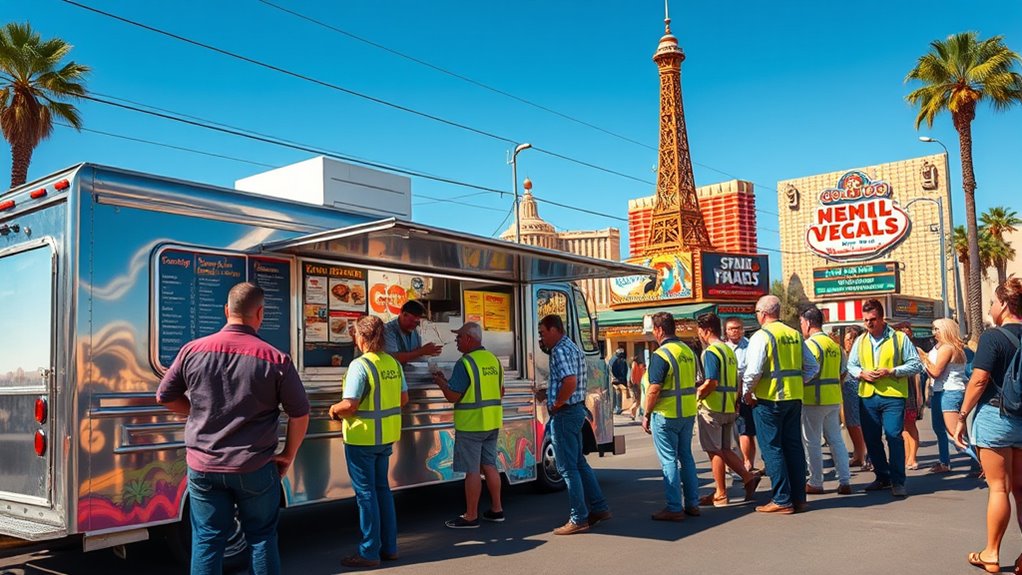
To guarantee your food truck remains compliant with health and safety standards, you must prioritize regular inspections, proper food handling, and sanitation practices. You’ll need to pass an annual health inspection by the Southern Nevada Health District, covering storage, sanitation, refrigeration, and cooking appliances. Before obtaining permits, complete a Food Safety Manager Certification or approved Food Handler Course. Keep your hygiene protocols strict, including onboard handwashing stations, clean uniforms, hair restraints, and no jewelry. Maintain proper temperature controls with approved refrigeration and heating equipment, logging temperatures during inspections. Use approved servicing areas for food prep and disposal, avoiding residential locations. Regularly clean and remove waste, and establish procedures for contamination events. Food establishments require valid permits issued by health authorities to operate legally, so ensuring all documentation is up to date is essential. Consistent compliance guarantees your truck stays safe, legal, and ready to serve your customers. Additionally, understanding best practices for food safety can help prevent violations and ensure customer satisfaction.
Understanding Costs and Fees for Starting Your Food Business
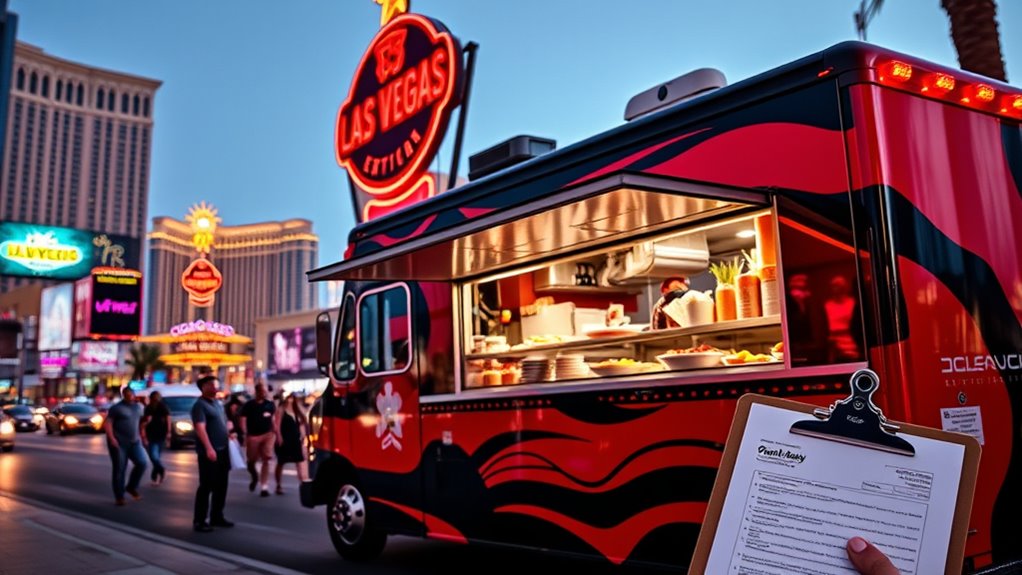
Starting your food truck business means understanding the costs involved, from licensing fees to daily operating expenses. Permit and license costs can vary widely depending on your location, so planning ahead is essential. Additionally, you’ll need to budget for ongoing expenses like inventory, insurance, and marketing to keep your operation running smoothly. Being aware of the local regulations and potential hidden costs can help you avoid unexpected expenses and ensure a successful launch. Moreover, understanding the risks associated with merchant services can help you select reliable payment solutions and avoid costly security vulnerabilities.
Licensing and Permit Fees
Understanding the licensing and permit fees is essential when launching your food truck in Las Vegas, as these costs can considerably impact your startup budget. A flat, yearly multi-jurisdictional food truck license costs about $150 per primary area, with additional fees for other parts of Las Vegas Valley. Each new truck requires a $50 vehicle processing fee, and the initial mobile food vendor gross license fee is $100. Semiannual license fees are based on gross sales, and Clark County business licenses include a $45 one-time application fee plus variable license costs. You’ll also need health permits from the Southern Nevada Health District, vehicle permits, and possibly an Employer Identification Number (EIN). These fees, combined, can range from $1,864 to over $28,000 annually, depending on your compliance and jurisdiction. The new multi-jurisdictional licensing plan streamlines these costs by offering a unified license at a fixed rate, reducing confusion and administrative burden for vendors. Additionally, understanding the permitting process helps ensure you meet all legal requirements without unexpected expenses.
Operational Cost Considerations
Operational costs are a critical factor in launching your food truck in Las Vegas, as they directly impact your profitability and daily operations. Understanding these expenses helps you budget effectively. For example:
- Fuel, propane, and generator costs can range from $300 to $3,000 monthly, depending on routes and equipment. Proper planning for fuel efficiency can help reduce these expenses.
- Maintenance for tires, engines, and kitchen appliances averages $500 to $1,000 each month.
- Staffing expenses for 2-4 employees typically fall between $6,000 and $12,000 monthly, influenced by wages and hours.
- Commissary and parking fees in Las Vegas add another $1,000 to $1,500, plus location-specific parking costs.
- Additional costs such as insurance, supplies, and marketing should also be factored into your overall budget to ensure comprehensive financial planning for a successful launch.
Choosing Prime Operating Locations and Setting Operating Hours
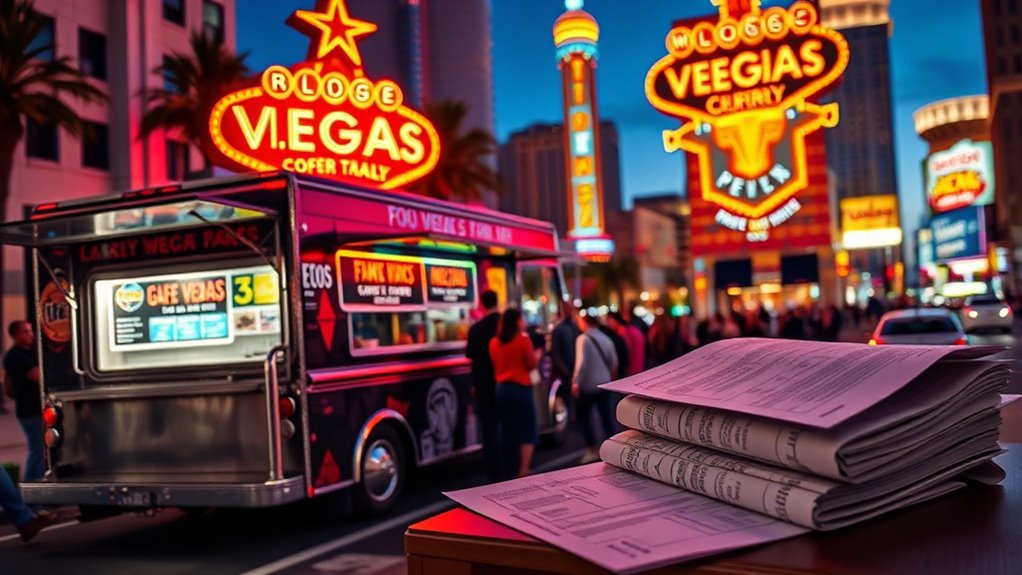
Choosing prime operating locations and setting appropriate hours are essential for maximizing your food truck’s success in Las Vegas. Focus on high-traffic spots like the Las Vegas Strip, Chinatown at Spring Mountain Rd, or near major landmarks such as casinos and entertainment districts like Fremont Street and LINQ Promenade. Proximity to hospitals, offices, and event spaces ensures a steady flow of customers during lunch and dinner. Rotating between residential and commercial zones keeps your brand fresh and broadens your reach. Your operating hours should align with customer demand; late evenings from 7 pm to 1 am work well in nightlife areas, while earlier hours near hospitals or offices capture daytime crowds. Regularly update your schedule on social media to keep customers informed and engaged. Verifying permits and adhering to local regulations is crucial for avoiding fines and ensuring long-term operation; the Las Vegas Department of Business and Industry provides comprehensive guidance on necessary licenses and health codes. Additionally, understanding bank SWIFT/BIC codes can be helpful if you plan to handle international transactions for supplies or equipment.
Developing a Menu That Meets Local Regulations and Customer Preferences
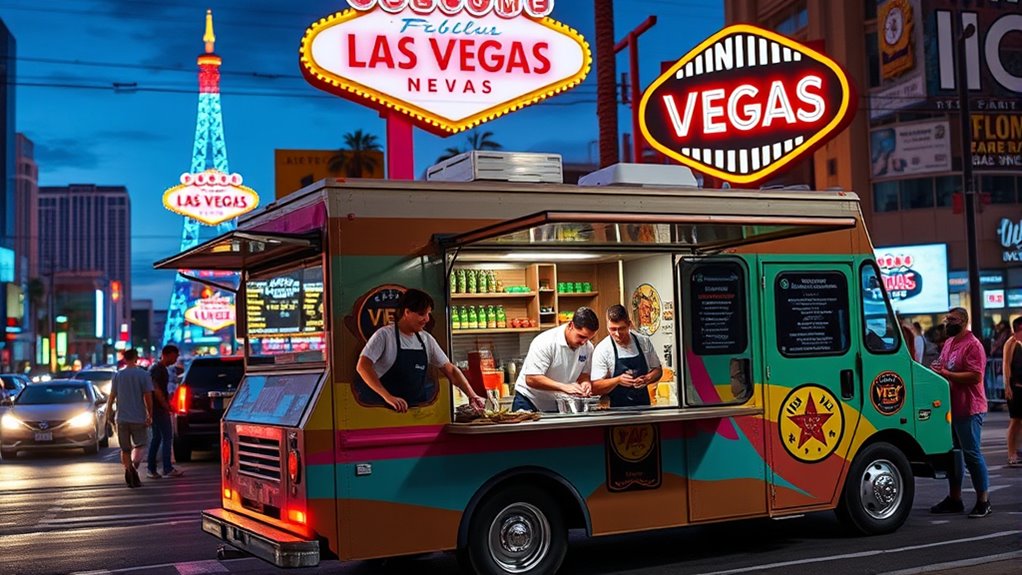
When developing your menu, you need to make certain it complies with Nevada health regulations and equipment limitations. Consider local food trends and customer preferences to create offerings that appeal to both tourists and residents. Balancing safety requirements with popular flavors will help your truck succeed in the competitive Las Vegas scene. Additionally, understanding regulatory compliance is essential to ensure your menu and operations meet legal standards.
Menu Compliance and Regulations
How can you guarantee your food truck menu aligns with local regulations and meets customer expectations? Start by following these steps:
- Ensure all menu items comply with Southern Nevada Health District standards, including proper food handling, storage temperatures, and avoiding cross-contamination. Maintaining proper temperature control is essential for food safety.
- Obtain and display all necessary health permits prominently on your truck and verify your menu adheres to restrictions set by the Las Vegas mobile food vendor license.
- Use accurately sourced ingredients, clearly label allergens, and maintain traceability to meet labeling and safety rules.
- Design a simple, feasible menu that fits your truck’s space, minimizes risk, and allows for proper utensil use and sanitation. Keep documentation and allergen info visible and up-to-date.
Local Food Trends and Preferences
Aligning your food truck menu with local regulations is just the first step; understanding what Las Vegas customers crave guarantees your offerings stand out. The city’s diverse population loves a mix of American, Asian, and fusion cuisines, with trending dishes like pho, ramen, and sushi. Plant-based and customizable options, such as build-your-own bowls, appeal to health-conscious diners. Brunch items with creative presentation, like avocado toast and specialty eggs, are popular for their Instagram appeal. Fusion flavors and bold spices match local demand for diverse, flavorful foods. Incorporate signature Asian dishes with American twists and sustainable ingredients to attract both locals and tourists. Focus on portable, quick-service options in high-traffic areas to meet the city’s vibrant dining scene. Understanding layer concepts can help streamline your kitchen operations and improve overall efficiency.
Effective Marketing Strategies to Grow Your Food Truck Brand
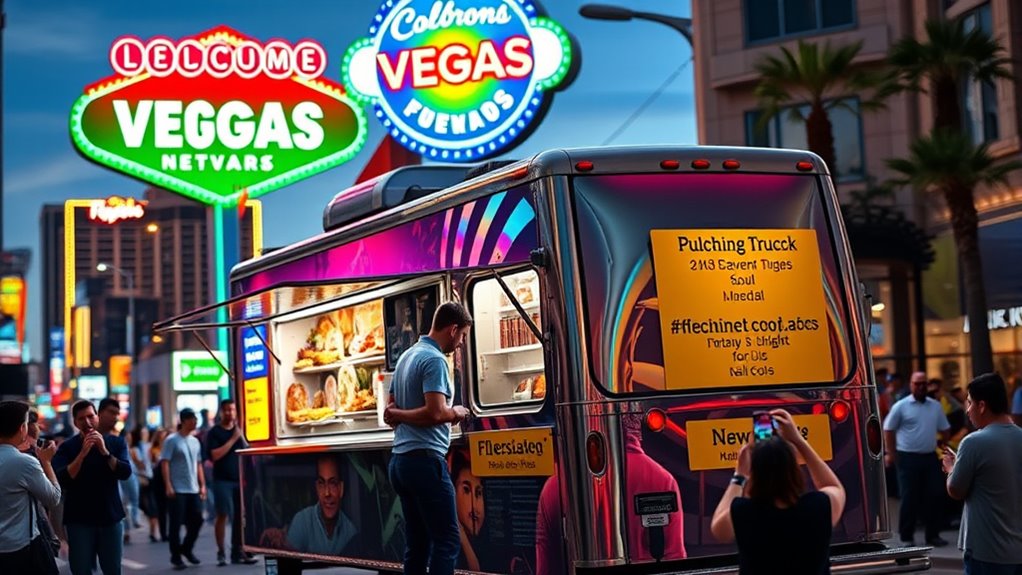
To effectively grow your food truck brand, leveraging a mix of targeted marketing strategies is essential. Here are key approaches:
- Use social media platforms like Facebook (used by 75% of food trucks) to promote daily specials, location updates, and engage with customers. Regular posts can boost sales by 20% and increase customer spending by around 15%. Social media marketing significantly enhances customer engagement and brand visibility. Additionally, incorporating best practices for digital marketing can optimize your online presence and attract more followers.
- Participate in local events and festivals—80% of trucks do this—to increase visibility, gather feedback, and attract new customers.
- Build customer loyalty through programs and email marketing, with over half of food trucks seeing a 30% rise in repeat visits.
- Tailor your marketing to your target audience, especially Millennials and Gen Z, using SEO, appealing visuals, and eco-friendly messaging to strengthen brand affinity.
Frequently Asked Questions
How Long Does the Entire Food Truck Licensing Process Typically Take?
The entire licensing process usually takes between 1 to 3 months. You’ll start by submitting your application, which can take a few weeks to process. Then, health and safety inspections, background checks, and permit approvals follow, often extending the timeline. If everything goes smoothly and you meet all requirements, you can expect to get your license within this timeframe, but delays are possible depending on inspections and background investigations.
Are There Any Restrictions on Types of Cuisine for Food Trucks in Las Vegas?
You might wonder if there are restrictions on cuisine types for food trucks in Las Vegas. Currently, there are no explicit legal limits on what cuisine you can serve, as long as you meet health and safety standards. You can offer anything from tacos to sushi, but guarantee your menu complies with sanitation laws. Keep in mind, local zoning and sensitive area restrictions could influence your choice of location or cuisine style.
Can I Operate My Food Truck at Multiple Locations Simultaneously?
They say “don’t put all your eggs in one basket,” and that’s true here. You can’t operate one food truck at multiple locations simultaneously without meeting strict rules. You’ll need separate licenses for each spot or follow movement regulations, like moving at least 150 feet after 30 minutes. Proper permits, signage, and compliance with local ordinances are essential, so plan carefully to stay within the law and keep your operation smooth.
What Are the Specific Requirements for Open-Air Vending Permits?
You need to meet specific requirements for open-air vending permits in Las Vegas. Make certain your proposed location is properly zoned within city limits and include site plans and photos with your application. You must obtain a Business License with a Vendor Endorsement, and if operating from a fixed site, secure a Conditional Use Verification. Additionally, provide documentation like site agreements, and get approval from the Fire Prevention Division. Fees and inspections are also part of the process.
How Often Do Health Inspections Need to Be Scheduled and Conducted?
You need to schedule and prepare for health inspections regularly, at least once a year, but possibly more if issues arise. You must schedule inspections through the Southern Nevada Health District, pay fees upfront, and guarantee your vehicle meets all health and safety standards. Unannounced inspections can happen anytime, so staying compliant at all times is vital. Passing these inspections is vital for your food truck’s operation and avoiding penalties.
Conclusion
Starting a food truck in Las Vegas can be a lucrative venture, with over 5,000 mobile food vendors currently operating in the city. By managing permits, ensuring safety compliance, choosing prime locations, and developing a compelling menu, you set yourself up for success. Remember, effective marketing is key—consider social media to reach a wider audience. With the right approach, you can turn your food truck into a popular local favorite and enjoy the vibrant Vegas food scene.
